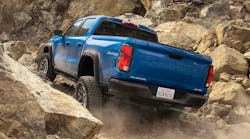Any first-year tire guy can recite the obvious advantages of cleaning wheels and rims. Between the road salt, chemical ice-melting solutions and just plain dirt, the steel or aluminum surfaces are constantly under attack.
In some instances, the solution is as simple as a fresh water rinse, especially during the winter. When dirty snow and ice is allowed to accumulate on wheel and rim surfaces, the life of the finish will suffer to some degree. In extreme circumstances, a mild detergent may be necessary, but fleets must remember that some states have special drainage requirements for these practices.
Technological advances in the finishes used on both steel and aluminum have made the fresh water approach with a standard pressure-washer a common solution. Since every state has its own regulations, I can't say with 100% certainty that there are no regulations prohibiting rinsing wheels — other than those related to drought conditions, of course. However, I haven't heard of any.
The only caution that I can think of is for the technicians to be careful about how close they place the tip to the surface. None of the finishes are tested at the thousands of pounds of pressure that a standard pressure-washer can deliver, so any damage resulting from this process will fall outside the warranty.
And while technicians are cleaning off the wheels and rims, they should also give a quick rinse to the tires. Based on my experiences, clean tires will typically last longer and retread better than dirty ones. I don't know a lot about the chemical properties of anti-oxidants and anti-ozonants, but I do know that in order for them to work at maximum performance, clean surfaces are preferred.
I'm not suggesting showroom-new detailing; a quick rinse of all the tires is enough to have a positive impact on the life of tires and casings. Again, the only caution is that technicians should avoid placing the tip too close to the sidewall, especially if the water is heated. I've seen tires destroyed by sidewall blisters that were caused by hot water, pressure-washers and overly aggressive techs.
Any fleet that currently retreads its own tires should make invest in some form of cleaning program, especially during the winter. Not every retread plant is equipped to clean every casing. It's been my observation over the years that dirty casings are rejected more often than clean ones. And while nobody knows for sure if the dreaded “weather checking” or “dry rot” that beckons the attention of enforcement officers and keeps retreaders awake at night can be minimized if tires are occasionally cleaned, almost everyone agrees on the downside of “sidewall dressings.”
To most tire manufacturers and retreaders, the use of chemicals to improve the appearance of tire sidewalls is the absolute worst thing you can do to the tire. In fact, some of these products will actually cause the weather checking to accelerate as the anti-oxidants and anti-ozonants are drawn to the surface. I'll probably get some hate mail for saying this, but anyone using sidewall dressings should contact their tire manufacturers immediately to determine if the products may damage the tire. In some instances, cleaner may actually be worse.


